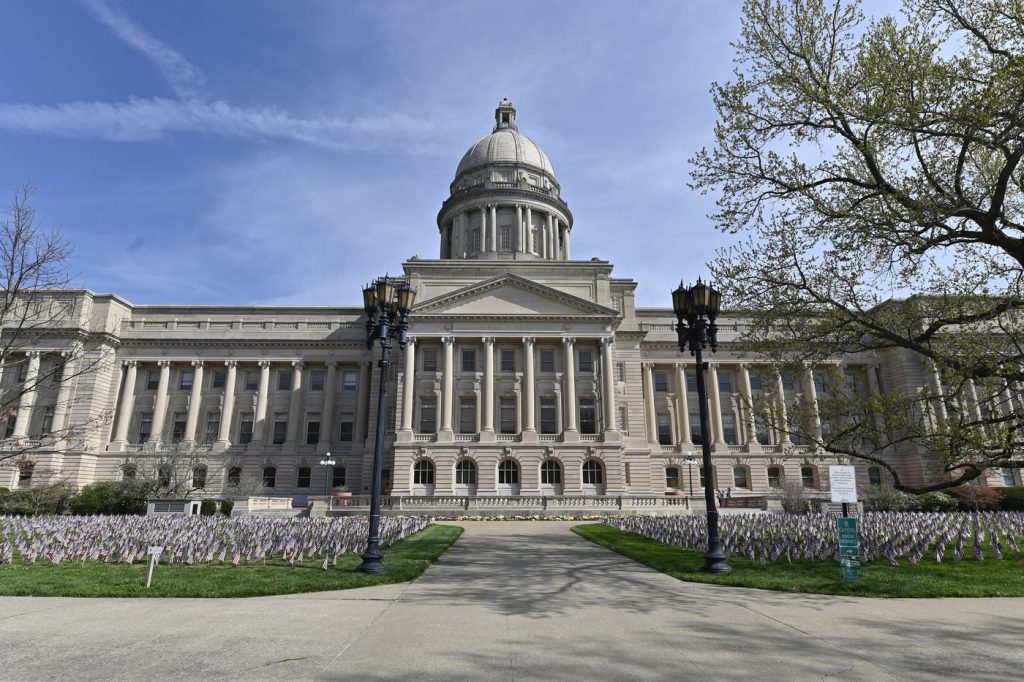Income tax cut expected to be a top priority as Kentucky lawmakers convene for a 30-day session

Posted Jan 7, 2025 03:03:32 PM.
Last Updated Jan 7, 2025 03:15:36 PM.
Kentucky’s Republican-dominated legislature convened Tuesday to start a 30-day session expected to include action to reduce the state’s individual income tax rate. GOP lawmakers also will resume efforts to curb diversity, equity and inclusion practices on college campuses.
While their constituents back home were digging out from a massive winter storm, the House and Senate gaveled into session at midday amid the usual opening day pomp. New lawmakers were welcomed and stacks of bills were introduced in both chambers. Democratic Gov. Andy Beshear will present his priorities in his State of the Commonwealth speech, set for Wednesday evening.
With supermajorities in both chambers, Republican legislators will set the agenda and determine the outcome of legislation. They wield enough clout to override any gubernatorial vetoes.
Priorities will include a measure to reduce the individual income tax rate to 3.5% from 4%, to take effect in 2026. Top GOP lawmakers announced last year that the state had met the financial conditions needed to set in motion another cut in the tax rate.
As lawmakers were opening their session, Beshear reaffirmed his support for the tax cut, telling reporters: “I think we can handle one more income tax reduction, especially with our economy booming.” Beshear is one of several Democratic governors who are the subject of early speculation as potential contenders for the party’s presidential nomination in 2028.
Since Republicans passed a tax overhaul in 2022, the personal income tax in Kentucky has gradually been reduced by increments of a half-percentage point, conditioned on meeting benchmarks that ensure revenues are sufficient to meet state spending needs.
Almost every U.S. state enacted some sort tax cut or rebate as budget surpluses soared over the past several years. With revenue growth slowing, that tax-cutting trend may also decelerate. But at least some states appear poised to debate additional tax cuts.
Property tax cuts are a priority in several states, including for Republicans who control the Kansas and Wyoming legislatures. Utah Gov. Spencer Cox, a Republican, has proposed ending the state’s tax on Social Security benefits. And New York Gov. Kathy Hochul, a Democrat, has proposed a significant expansion of the state’s child income tax credit.
Kentucky lawmakers also will focus on unfinished business from a year ago, including the push to limit diversity, equity and inclusion initiatives at public universities. Anti-DEI legislation died last year i n Kentucky amid a House-Senate impasse — resulting in a rare setback for the GOP on a priority, hot-button issue. It reflects a broader conservative quest in GOP-led states to curb DEI initiatives.
The prospect of DEI legislation resurfacing in 2025 had an impact on some campuses. The University of Kentucky announced last August that it was disbanding its office promoting diversity and inclusion efforts in response to questions from state policymakers. The university’s president stressed that the school’s core values remained intact — to protect academic freedom and promote a “sense of belonging” for everyone on campus, regardless of background or perspective.
Lawmakers could also debate whether to bolster oversight of Medicaid — a joint federal and state program that provides health coverage for low-income Kentuckians and people with disabilities.
Spending on Medicaid accounts for a significant portion of the state budget and the program covers more than a third of Kentucky’s population, Republican state Rep. Adam Bowling said recently.
“We have a deeply vested interest in ensuring that the program is operating effectively and efficiently for both those who depend on it and the taxpayers who pay for it,” Bowling said.
Lawmakers’ biggest responsibility — crafting a state budget — won’t be on the agenda this year since they passed a two-year budget in 2024. But they could choose to reopen the budget this year to make adjustments or insert new spending items.
Lawmakers will meet this week and then head home until early February, when the 2025 session will resume. The session will wrap up in late March.
___
Associated Press Writer David Lieb in Jefferson City, Missouri, contributed to this report.
Bruce Schreiner, The Associated Press








